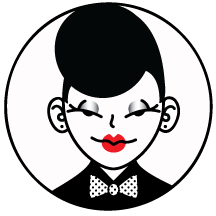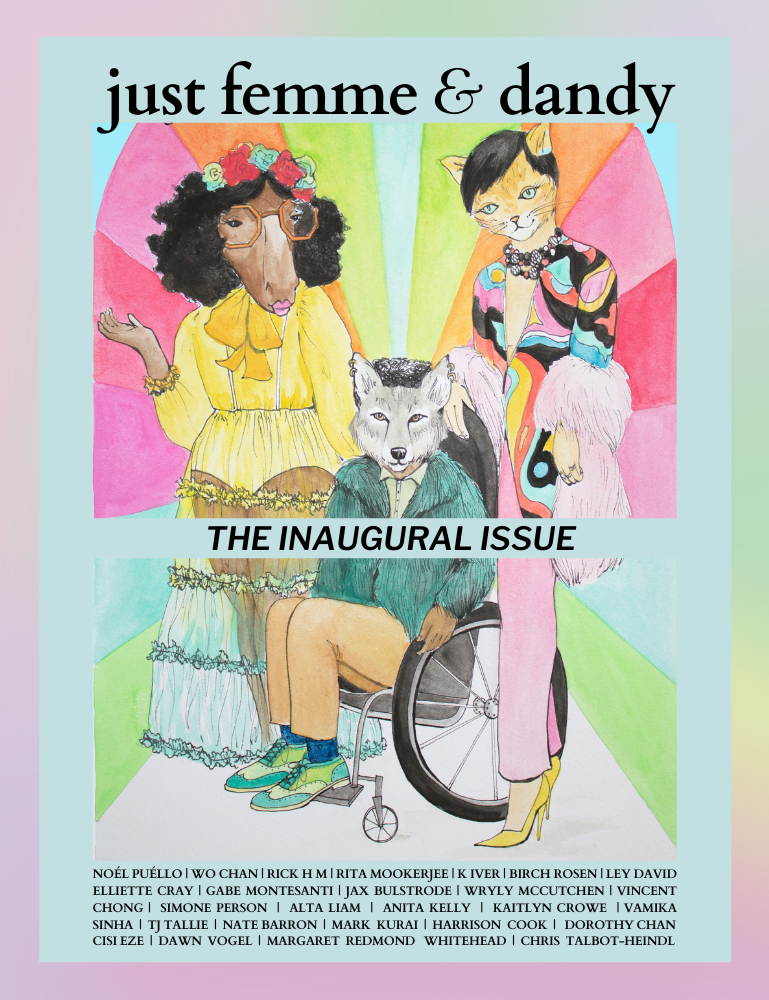armor
gabe montesanti
The first time I brought my girlfriend Kelly to my hometown, we wore what we thought could protect us: frilly pink dresses, ballet flats, and cheap, chunky jewelry. We released our long hair from our usual high ponytails so it hung like streamers down our backs. She arrived mid-day while my parents were at work, and we fucked in my childhood bed—snowman sheets, my stuffed bear smiling vaguely from the side table. It wasn’t safe to stay there for long, so we gathered our things and set off.
In the sunlight, the dresses were our armor and our costumes. It seems ludicrous now—the notion that wearing a dress could somehow deflect the suspicion of gayness. But I was eighteen and terrified, relying on the stereotypes my mom had spouted all my life. “Lesbians dress like men,” she once told me. “That’s why they’re so easy to identify.”
That wasn’t the only thing my mother told me about lesbians. “They’re disgusting,” she often said. “They’re damaged. They need people like you and me to protect them.” About Kelly, she said, “Don’t you dare bring her here. Don’t you dare introduce me to her. I never want to meet the woman who ruined your life.”
We planned Kelly’s visit as though it were a bank heist—carefully arranging timelines, locations, and contingency plans. One hour, tops, at my childhood home. A brief walk to my old elementary school, backstreets only. Then, lunch under a bridge behind an abandoned train station. It was too close for comfort to the place where my mother worked, and we worried someone might recognize me. That is why we needed the dresses.
The depot had been nonfunctional for as long as I had lived there, though the city council apparently had high hopes for revitalizing it. Flyers were hung in the post office and the library asking for support from constituents. The vision was strong—the tracks were already laid, and they spanned the state of Michigan and westward past Chicago. Bringing back a functional train station would kickstart the economy. People would flock to my town. That was the idea, at least.
I chose the depot as a lunch venue for both the solitude and the rustic beauty. Kelly wouldn’t get to see much of my hometown, so it was important that the little she did was going to be memorable. To get to the bridge, we passed through a field of bishop’s lace in which sat an abandoned red caboose. Under the bridge were metal beams covered in graffiti, which I found equally striking. The paint chipped easily, and a collection of bright colors fell off the walls and landed on the ground. I had a habit of picking up the little chips of paint and crunching them between my fingers, leaving the pile more pixelated than I found it.
It was difficult climbing up the side of the railroad tracks to the spot I had planned for us to sit. The ground was uneven, and the incline was steep. Our dresses kept snagging on branches. Mud seeped into our ballet flats. I thought lovingly back to the combat boots tucked in my closet back home: the seed of a tougher, more authentic style I would develop in the years to come.
We sat on the ledge under the bridge to eat lunch, legs dangling. I wasn’t used to seeing Kelly with her hair down. Each time she bit into a cracker, big strands fell into her eyes and she had to push them back.
When she caught me looking at her, she cracked a smile. “What are you thinking about?” she asked.
“I just feel bad,” I said, gesturing to the hair, the dress, the ballet flats.
“You already promised it won’t be forever,” she told me. That was our deal: she would do anything I asked in exchange for forward motion.
Sometimes, I felt resentful of Kelly. Her family had its share of problems, but her queerness wasn’t one of them. She had been the third in her family to come out, and her two older brothers had shepherded her through the process. When she eventually told her parents, they welcomed me into their home without any reservations. When we visited, we wore whatever we wanted: t-shirts with heavy metal logos, sleeveless hoodies, combat boots.
Under the bridge, I asked her what her name would be if it wasn’t Kelly.
“I like my name,” Kelly said. Our relationship wasn’t new enough anymore for strange questions to be inherently charming.
“But I’m saying if you couldn’t have your own name, what would it be?” I pressed.
“Probably Piper,” she said. “Or Paige. Or maybe Sasha.”
“I kind of like Sasha,” I said. Then, hesitantly, “Can I change your name to Sasha in my phone?”
“You mean, like, in case your mom happens to see a text or something?” she asked.
I nodded. We both remembered what had happened the day my mother had gone through our messages on Facebook. The conversation she had read between us involved speculation about whether the Supreme Court would one day allow gay people to marry.
Kelly’s face hardened at the memory. “You can call me whatever you want as long as you don’t give up on me,” she said.
I wanted to kiss her under that bridge, but it was too public—too open. The chance of someone seeing was too great. Still, I wanted to cradle her head and pull her mouth to mine. Her clothes weren’t the same, her hair wasn’t the same, and she didn’t look like the woman I’d fallen for, but that was all my fault. I wanted to kiss her to prove I loved her—Kelly, not Sasha—and that I was sorry. But I’m not sure a kiss would’ve been able to communicate that much, even if I’d been brave enough to try.
a professional headshot of a white queer wearing a black leather jacket over a black shirt with a scalloped collar. She has brown chin length wavy hair, smokey purple eye makeup, a nose ring and red lipstick.
about the artist
Gabe Montesanti is a queer, Midwestern roller derby player. She earned her BA from Kalamazoo College and her MFA from Washington University in St. Louis. Her piece, "The Worldwide Roller Derby Convention" was recognized as a notable essay in The Best American Essays 2020. Her roller derby memoir, BRACE FOR IMPACT, is forthcoming from The Dial Press in 2022.


